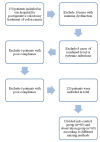Impact of Ahmadi Continuing Nursing Model on self-care ability, stoma complications and quality of life of colostomy patients
- PMID: 39573999
- PMCID: PMC11583414
- DOI: 10.1186/s12876-024-03497-0
Impact of Ahmadi Continuing Nursing Model on self-care ability, stoma complications and quality of life of colostomy patients
Abstract
Objective: To analyze the effects of Ahmadi Continuing Nursing Model (ACNM) on the self-care ability, stoma complications and life quality in colostomy patients.
Methods: The clinical data of 120 patients who underwent postoperative colostomy in our hospital from June 2020 to June 2023 were retrospectively analyzed. The patients were divided into control group (n = 60, treated with routine nursing) and observation group (n = 60, treated with the ACNM on the basis of routine nursing) according to different nursing methods. Postoperative recovery of gastrointestinal function, ostomy adaptability, self-care ability, and life quality before and after nursing were compared. The probability of complications before and after nursing was recorded between the two groups.
Results: The time of first exhaust was 3.65 ± 0.82 d, the time of first meal was 1.83 ± 0.65 d, and the first bowel sound recovery was 1.47 ± 0.53 d in the observation group, which were shorter than those in the control group (4.38 ± 1.20 d, 3.12 ± 1.15 d, 2.39 ± 1.06 d, P < 0.001). After intervention, the positive emotions in the ostomy adaptation score were 32.09 ± 5.03 points, negative emotions were 31.41 ± 5.70 points, social life adaptation were 27.12 ± 4.98 points, and the total score was 90.78 ± 5.98 points in the observation group, which were significantly higher than those in the control group (26.32 ± 4.52 points, 24.25 ± 6.02 points, 20.25 ± 4.02 points, 67.25 ± 6.09 points, P < 0.001). The self-willingness was 34.18 ± 4.02 points, self-care skill was 10.57 ± 2.23 points, self-care knowledge was 18.59 ± 3.10 points, and the total score was 63.18 ± 4.98 points in the observation group, which were significantly higher than those in the control group (25.25 ± 3.08 points, 8.72 ± 2.13 points, 15.26 ± 2.70 points, 45.69 ± 4.09 points, P < 0.001). The physical function was 79.74 ± 2.81 points, psychological function was 76.71 ± 3.05 points, social function was 78.11 ± 3.50 points, and material life status was 60.06 ± 2.98 points in the quality of life in the observation group, which were significantly higher than those in the control group (75.36 ± 2.68 points, 69.72 ± 2.93 points, 72.33 ± 3.42 points, 51.23 ± 3.08 points, P < 0.001).
Conclusion: ACNM effectively promoted the recovery of gastrointestinal function after surgery in colostomy patients by improving patients' stoma adaptability, self-care ability and life quality and reducing the occurrence of complications, which was worthy of promotion.
Keywords: Ahmadi continuing nursing model; Colostomy; Complications; Quality of life; Self-care ability.
© 2024. The Author(s).
Conflict of interest statement
Declarations. Ethics approval and consent to participate: All procedures performed in studies involving human participants were in accordance with the ethical standards of the institutional and/or national research committee and with the 1964 Helsinki declaration and its later amendments or comparable ethical standards. All procedures performed in studies were in accordance with the ethical standards of the ethics committee of Shengjing Hospital of China Medical University. Informed consent was obtained from all individual participants included in the study. The study was approved by the Ethics Committee of The Affiliated Yantai Yuhuangding Hospital of Qingdao University Shengjing Hospital of China Medical University (2020PS019K). Consent for publication: Not applicable. Competing interests: The authors declare no competing interests.
Figures
Similar articles
-
Effects of hospital-family holistic care model on the health outcome of patients with permanent enterostomy based on the theory of 'Timing It Right'.J Clin Nurs. 2020 Jul;29(13-14):2196-2208. doi: 10.1111/jocn.15199. Epub 2020 Mar 20. J Clin Nurs. 2020. PMID: 31970830 Clinical Trial.
-
Cross-cultural Adaptation and Validation of the Stoma Quality of Life Questionnaire for Patients With a Colostomy or Ileostomy in Brazil: A Cross-sectional Study.Ostomy Wound Manage. 2017 May;63(5):34-41. Ostomy Wound Manage. 2017. PMID: 28570247
-
The Differences in Postoperative Nursing Between Temporary Ileostomy and Temporary Colostomy: A Retrospective Cohort Study.Nurs Open. 2025 Mar;12(3):e70189. doi: 10.1002/nop2.70189. Nurs Open. 2025. PMID: 40102046 Free PMC article.
-
Stressors relating to patient psychological health following stoma surgery: an integrated literature review.Oncol Nurs Forum. 2013 Nov;40(6):587-94. doi: 10.1188/13.ONF.587-594. Oncol Nurs Forum. 2013. PMID: 24161637 Review.
-
Surgical management of ostomy complications: a MISSTO-WSES mapping review.World J Emerg Surg. 2023 Oct 10;18(1):48. doi: 10.1186/s13017-023-00516-5. World J Emerg Surg. 2023. PMID: 37817218 Free PMC article. Review.
Cited by
-
Latent profiles and influencing factors of quality of life among patients with colorectal cancer and an enterostomy in Southwest China: A multicenter cross-sectional study.Asia Pac J Oncol Nurs. 2025 Jun 18;12:100745. doi: 10.1016/j.apjon.2025.100745. eCollection 2025 Dec. Asia Pac J Oncol Nurs. 2025. PMID: 40800675 Free PMC article.
References
-
- Fabregas JC, Ramnaraign B, George TJ. Clinical updates for Colon Cancer Care in 2022. Clin Colorectal Cancer. 2022;21(3):198–203. - PubMed
MeSH terms
LinkOut - more resources
Full Text Sources


